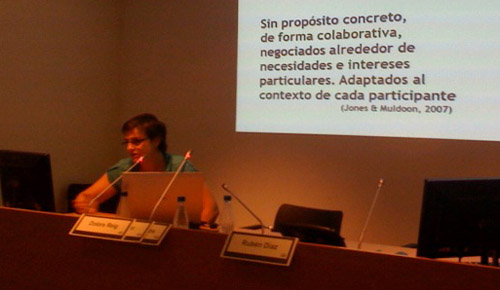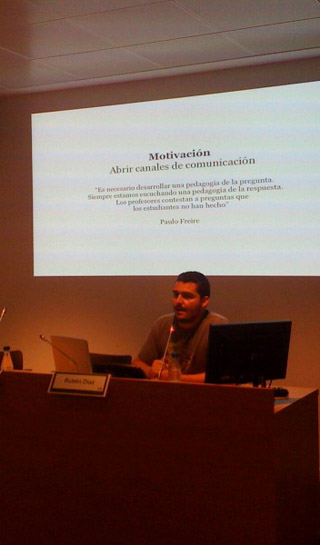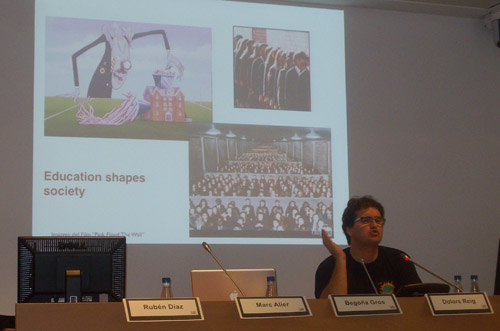By Ismael Peña-López (@ictlogist), 30 June 2009
Main categories: Education & e-Learning, Meetings, Open Access
Other tags: dolors_reig, uocunescoosl
1 Comment »
Notes from the Working Session on Open Social Learning, organized by UOC UNESCO Chair in E-Learning and held in Barcelona, Spain, on June 30th, 2009. More notes on this event: uocunescoosl.
Open Social Learning in Spain. Clarifying Concepts
Dolors Reig
Dolors Reig. Photo by Carlos Albaladejo
Traditional e-Learning: everything preset, all paths settled. The evolution has then been, from the web to the social web, and from the social web to the personal web (Nova Spivack).
New ideas that shape the social web:
- Intercreativity
- Collective intelligence
- Smart mobs
- Wisdom of the crowds
- Architecture of participation
- Sharism
Open Social Learning
- Digital natives: It’s problable, though, that the so-called digital natives they actually are “hanging out” online (danah boyd). Thus, the digital knowledge might not be that high within digital natives as we should expect.
- Connectivism: the Internet is so shaped to learning because it works as we do, we learn as networks, learning happens when connections are created, the ability to learn is more important than knowing, etc.
- Social learning: if markets are conversations (Cluetrain Manifesto), education and learning are also conversations, the prosumers and active students being the main characters of this era and peer-to-peer being the best way to acquire information and knowledge. From the “I think therefore I am” to the “we participate, therefore we are” (Minds on Fire: Open Education, the Long Tail, and Learning 2.0).
- Informal Learning: Jay Cross states that 70-90% of corporate learning is informal. We have to enable this informal learning so that it can happen.
- e-Learning 2.0
- Generative Learning
- Communities of Learning
- Constructivism
- Edupunk
Creativity: We should be focusing in what motivates people (à la Maslow): that’s why social networking sites are so successful.
Autonomous learning: what really drives knowledge is the process, not the output.
Universal, free and democratic learning (Soumitra Dutta).
Minimally invasive education, taking the example of Sugata Mitra.
Lifelong learning, immersive learning, non-stop learning, ubiquitous learning.
An active role that is required to remix. At its turn, remixing asks for multiliteracies.
Metaverses: Augmented reality, lifelogging, etc.
Changes of roles: the student is not passive, but a participant. The teacher is a facilitator, a curator. And the information becomes a perpetual beta.
Technology becomes too a very important part of the equation: open APIs or all technologies that enable sindication (XML/RSS, Atom, etc.) are true drivers of this change.
Main conclusions
- A web simple to use
- People, collectives, interests, tags, twines, groups
- Real time web
- “If we know the exact cost, the exact agenda of a project, it is probable that it is based on an obsolete technology” (Joseph Gavin, Jr.)
In all this landscape, the e-Portfolio is very relevant, as it perfectly fits with and represents the digital persona. And, complementing to this, e-competences are the necessary tools to get on with digital life.
Q&A
Begoña Gros: We have to make an effort to link the newest technologies and applications with learning or education, and not separating them as if they belonged to different spheres. A: Agreed. Indeed, as we increasingly happen to know more and more uses of the Internet, people shift from “bad” practices (online gambling, porn, etc.) towards “good” practices (learning, communicating with peers, etc.).
Jesús Martínez: Teachers need to learn so that they keep being up-to-date and can keep on teaching. We should accelerate the process of change, of adaptation, or re-learning. A: One of the direst problems is not only that people don’t know, but that people (e.g. teachers) do not know that they do not know.
Working Session on Open Social Learning (2009)
By Ismael Peña-López (@ictlogist), 30 June 2009
Main categories: Education & e-Learning, Meetings, Open Access
Other tags: ruben_diaz, uocunescoosl, zemos98
1 Comment »
Notes from the Working Session on Open Social Learning, organized by UOC UNESCO Chair in E-Learning and held in Barcelona, Spain, on June 30th, 2009. More notes on this event: uocunescoosl.
Open Social Learning en España: Diagnosis and Perspective
Rubén Díaz
Rubén Díaz. Photo by Carlos Albaladejo
Expanded education: Search for new ways of education that embed and adapt social and communicational processes that the Internet made possible.
Education can take place at every moment, in every place
. Inside and outside the walls of the academic institution.
We can virtually access all the information that the whole World generates (and has generated), but: Will we have the need for that much information?
(Nam June Paik, 1977). And we need to take control over the technologies that make possible the access to all that information and apply them to, for instance, Education (Noam Chomsky, 1998). Education is not, is being
(Paulo Freire). Nobody knows it all, everyone knows something, all the knowledge lays on the whole humankind
(Pierre Lévy). Today, the voice you speak with could not be your own voice
(DJ Spooky).
Margaret Meads (Culture and Compromise) stresses the fact of the non-linearity of knowledge and how we are stuck to the books. Jesús Martín Barbero states the importance of oral and visual culture nowadays (i.e. cyberculture) in opposition with the traditional written culture of education during the last centuries.
Knowledge is delocalized. Everyone’s interested in education, and everyone’s capable of learning.
Learning takes place when solving problems by going through them using creativity. But how and why are people creative? And how can the environment negatively affect the learning environment? Is the actual educational system a learning environment that fosters creativity?
The learning environment is the source of knowledge. Active and collaborative learning environments enable learning by doing. We need to disclose communication channels so that motivation happens. We need to develop a pedagogy of the question. We are used to a pedagogy of the answer, where the teacher answers questions that the students never put
(Paulo Freire).
We have to move towards the educommunication, avoiding the education of silence. Oriented self-education, expanded education. Expanded education is the communicative link between memory and remix to build the self from the world we speak from.
An adult assimilates:
- 20% of information heard
- 30% of observed
- 50% of observed and listened
- 70% of expressed by oneself
- 90% of elaborated by oneself
Experience: Platoniq‘s Bank of Common Knowledge in the 3000 viviendas de Sevilla.
Q&A
Enric Senabre: What about expanded assessment? A: The problem is not only assessment, but the whole system. And we should begin with youngsters and schools, and later on with the University.
Q: what about beyond formal education? A: At Zemos98 we schedule a yearly Festival, where different people can meet different kinds of knowledge.
Silvia Bravo: If all these approaches and technologies are so evidently good, why aren’t they more pervasive? Where are we failing? A: The blame is maybe on the moral majority of the mainstream, the socioeconomic system where education is business. A second aspect is contextualization: how to use technology to work locally.
Working Session on Open Social Learning (2009)
By Ismael Peña-López (@ictlogist), 30 June 2009
Main categories: Education & e-Learning, Meetings, Open Access
Other tags: marc_alier, uocunescoosl
4 Comments »
Notes from the Working Session on Open Social Learning, organized by UOC UNESCO Chair in E-Learning and held in Barcelona, Spain, on June 30th, 2009. More notes on this event: uocunescoosl.
Open Social Learning?
Marc Alier
Open Learning: We use to define problems so that some structured learning outcomes happen, but problems do not usually have unique solutions, as life. If we open education, we have to be aware that problems and solutions have to be open too.
Social Learning: If we do not do nothing as a society, we do not learn as a group. The interesting thing is to participate and be engaged within the community. Social Learning is learning as a group. But it is also about learning how to be social, is about education training people to socialize and, at the same time, to define the society as is: education shapes society.
Learn in Community: Moodle as the flagship of community learning. Related with hacker ethics: passion for what you do; freedom; value and social recognition; information and knowledge accessibility; activism; social commitment.
Marc Alier. Photo by Enric Senabre Hidalgo
Open, social and hacker ethics lead us to Learning in community by doing and sharing openly
.
When students are given control begin to feel confident on what they do. And things happen. People self-organize; new “solutions” or “answers” to pre-established problems/questions arise; and new knowledge emerges.
Some examples:
- Work on specific subjects but without constraints, being the output a collaborative text on a wiki + a presentation. Students take divergent directions from what one would expect, but with high quality output and high engagement.
- Collaborative (massive: circa 30 students) project management subject where the whole classroom defines a single project. Rules? Only traceability of work. Students would use all kind of web 2.0 applications to distribute roles and tasks, to schedule milestones, to distribute workload, etc. The teacher then becomes a mentor whose “sole” work is to monitor and guide the autonomous work of the students.
To be able to perform such a monitoring activity, the software needs to be prepared to do that monitoring. Tracing is a must and interoperability between applications another need so that different tools can be integrated and used during the learning (and teaching) process.
Q&A
Ismael Peña-López: what competences need teachers to become “open social learning monitors or mentors”? A: First step is accepting that the outcomes of open collaborative work is an open and unexpected outcome. And this is not a competence but an attitude. Once the teacher gives control away, they will bring in technology: the teacher does not need the technology to give it to the students, but to follow (and catch up with) them. The attitude is the key: what outcomes are you renouncing to in exchange of implication and satisfaction?
Dolors Reig: How to monitor? How to evaluate? How to make quantify performance? A: The important thing in technology is how you are going to evaluate, and then design the software. If the evaluation model is clear, technology should not be an issue… provided it is free software and you can edit its code and add new features.
Ismael Peña-López: Can we really always renounce to part of our syllabus, of our planned content? A: Are exams a real way to assess learning? Or are we teaching students to pass exams? If we want to transform the society we don’t need knowledge, we need abilities and competences. We need not to teach knowledge but to teach how to acquire new knowledge and to have a critical attitude towards the knowledge we reach.
Jesús Martínez: How do we cope with competition (in education and in society at large)? With inertias? A: The educational system is at stake, so inertias can be broken down in pieces if this is the general will or the general trend.
Working Session on Open Social Learning (2009)




